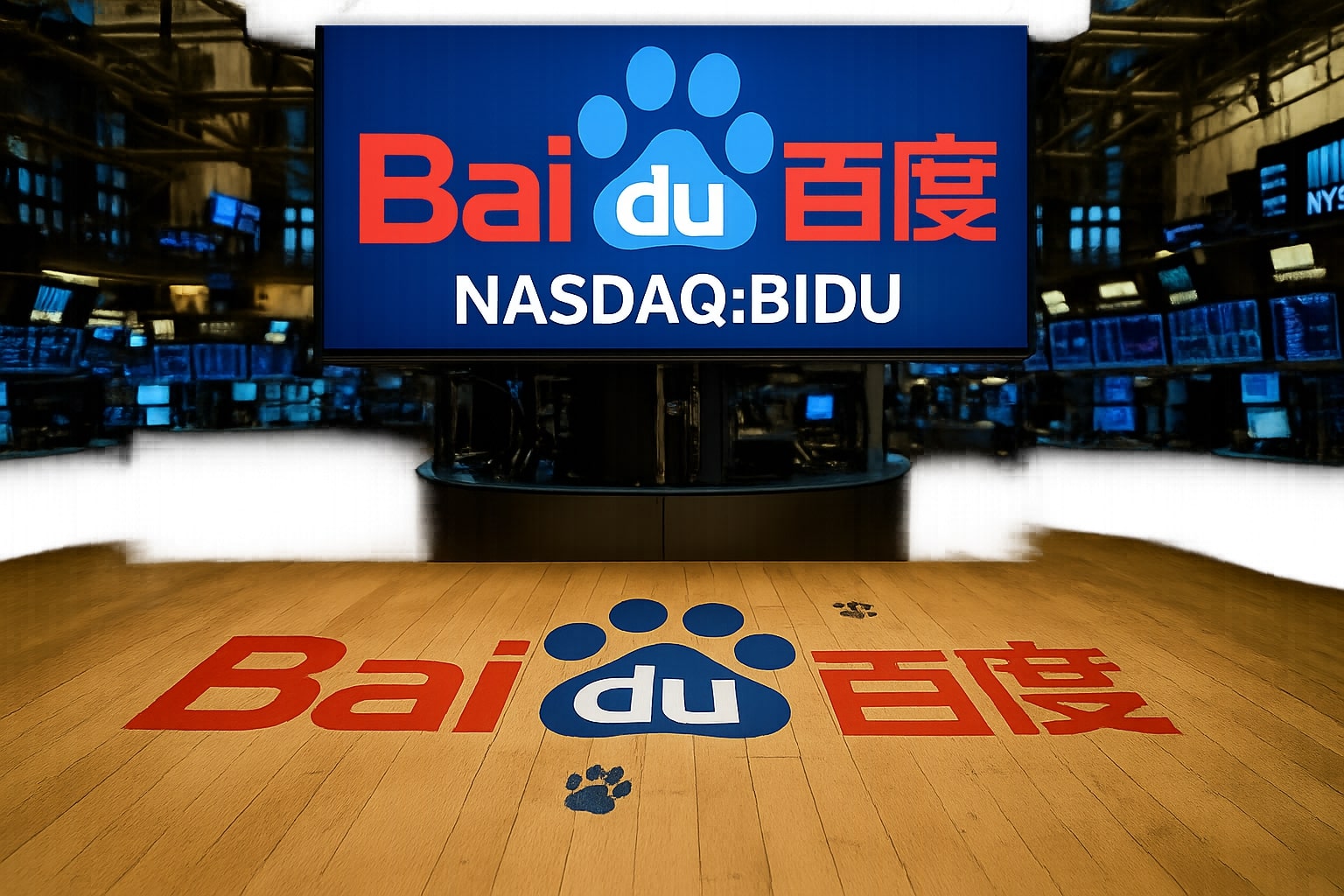
Is Baidu’s $82.40 Share Price a Rare Bargain on the Road to $107?
With NASDAQ:BIDU’s AI Cloud surging 26% in Q4 and digital ad revenues sliding 3%, can today’s $82.40 quote truly unlock a 30% rally to $107? | That's TradingNEWS
Overview of Baidu’s Valuation Dislocation and Target Price
At a prevailing ADS price of approximately $82.40, NASDAQ:BIDU is trading at just ten times Price‑to‑Cash Flow, a stark contrast to its historical peaks of twenty times in 2017 and again in 2021, as well as the 14.7x multiple that Alphabet currently commands. This compressed valuation implies a remarkable disconnect between market price and intrinsic worth, which our scenario analysis pegs at $107 per share—roughly 30 percent above today’s trading level—while a bear‑case floor of $61 limits downside to 26 percent. Such a skewed risk‑reward profile underpins a high‑conviction buy recommendation in a market where quality seldom trades at single‑digit multiples.
Digital Marketing Franchise: RMB 73 Billion in Revenue and Market Share Pressures
Baidu Core’s online marketing services generated RMB 73.0 billion (about $10.6 billion) last year, marking a 3 percent year‑over‑year contraction as China’s broader economy slowed. Desktop search share slid from 68.5 percent to 53.5 percent amid aggressive incursions by Microsoft’s Bing and Tencent’s AI‑powered WeChat search, which now delivers 80 percent AI‑generated results across its 840 million daily active users. Despite these headwinds, Baidu continues to capture over half of China’s digital advertising spend, and average cost‑per‑click rose 4 percent in the latest quarter, signaling that brands are still willing to pay for targeted reach even as budgets tighten.
AI Cloud Momentum: RMB 21.9 Billion in Sales with 26 Percent Q4 Growth
The AI Cloud division surged to RMB 21.9 billion ($3.2 billion) in 2024 sales, up 17 percent year‑over‑year and accelerating to 26 percent growth in the final quarter. ERNIE, Baidu’s large language model, processed 1.65 billion API calls and attracted 94 million monthly active users on Wenku AI, demonstrating robust developer and enterprise traction. While Alphabet’s cloud arm vaulted 30.6 percent to $43.2 billion, Baidu outpaced Alibaba’s 13 percent growth and illustrates a structural shift from cyclic digital ads toward higher‑margin enterprise AI services. Infrastructure utilization climbed to 78 percent in Q4, laying the groundwork for margin expansion as scale economies and premium AI inference pricing—currently commanding roughly $0.12 per thousand token calls—come online.
iQIYI Streaming Segment: Top‑Line Slide from RMB 31.8 Billion to RMB 29.2 Billion and Margin Compression
iQIYI’s content platform revenues declined 8 percent to RMB 29.2 billion ($4.2 billion) amid fierce competition and content costs that climbed 15 percent year‑over‑year. Operating margin for iQIYI shrank from 9.4 percent in 2023 to 6.2 percent in 2024, dragging overall operating income down by 70 basis points. Despite adding 15 million net subscribers, average revenue per user dipped to $7.85 per month. In response, Baidu is deploying ERNIE to automate translation, dubbing, and personalized recommendations, targeting a reduction in per‑episode localization costs from $150,000 to $90,000 within the next two quarters.
Operational Efficiency Gains: R&D, Cost of Revenue, and SG&A Trends
R&D expenses have fallen from 18.9 percent of revenue in 2022 to 16.6 percent in 2024, reflecting improved productivity as ERNIE transitions from lab to product. Cost of revenue, which includes traffic acquisition and data center expenses, eased from 51.7 percent to 49.7 percent over the same period despite a 15 percent uptick in traffic acquisition spending to secure premium placements. Selling, general and administrative costs ticked up modestly to 17.7 percent of sales—below the 18.5 percent peer average—driven by targeted go‑to‑market investments for AI Cloud and robotaxi services. These shifts lifted Baidu Core’s operating margin to 18.6 percent from 18.2 percent in 2023.
CapEx Discipline Amid an AI Arms Race: RMB 6.5 Billion Spent Versus RMB 11.2 Billion Prior Year
Capital expenditures plunged to RMB 6.5 billion ($940 million) in 2024, or 4.8 percent of revenue, down from RMB 11.2 billion (8.3 percent) the year before. This retrenchment stands in contrast to Alphabet’s ramp‑up to 15 percent of sales and Tencent’s tripling of AI infrastructure outlays to $10.7 billion. Management contends that rising utilization rates and strategic partnerships with regional hyperscalers will mitigate the need for additional greenfield builds, but sustaining sub‑5 percent CapEx intensity hinges on maintaining 80 percent data‑center occupancy and locking in multi‑year enterprise cloud agreements at premium rates.
Free Cash Flow Generation, Share Repurchases, and Dividend Optionality
Baidu averaged RMB 6.3 billion ($900 million) in free cash flow per quarter over the past five years, with Q4 2024 delivering RMB 7.1 billion ($1.03 billion) on the back of strong Cloud collections and lean working capital. The company repurchased $356 million of ADRs in Q4 and over $1 billion in 2024, utilizing 34 percent of its $5 billion buyback authorization. With net cash of RMB 45 billion ($6.5 billion), Baidu could introduce a 1.5 percent dividend yield without compromising balance sheet flexibility, a move likely to tighten valuation multiples from today’s 8.2x P/E toward peer‑median levels near 12x.
Scenario Analysis: From an $153.4 Bull Case to a $61.0 Bear Case
Under a bullish framework—1 percent revenue growth in 2025, ramping to 5 percent in 2026 and 8 percent in 2027, then sustaining 10 percent growth through 2034, with steady 16 percent cash margins and CapEx at 5 percent of revenue—discounted at a 7.6 percent WACC, fair value reaches $153.4, implying 86 percent upside. Conversely, a conservative model assuming 5 percent annual growth, elevated 8 percent CapEx to defend AI positioning, and constant margins yields $61.0, or 26 percent below current levels. Equal‑weighting both scenarios produces an expected value of $107.2 per share, 30 percent above today’s price.
Navigating Key Risks: Search Share Erosion, Macro Slowdown, and Competitive Intensity
Further share gains by Bing or WeChat integration could shave two to three percentage points off ad‑revenue growth. A sharper‑than‑expected downturn in China’s consumer spending would hit ad budgets and streaming renewals in tandem. Underinvestment in data‑center expansion risks throttling AI Cloud adoption just as inference workloads multiply, potentially forcing contract renegotiations at lower rates. Currency headwinds also pose a threat—each RMB 0.01 depreciation against the dollar erases $50 million in USD‑reported sales.
Expert Verdict: NASDAQ:BIDU as a High‑Conviction Buy with Controlled Downside
Trading at $82.40 with intrinsic value north of $107 and limited downside to $61, Baidu combines a resilient digital marketing moat, breakout AI Cloud growth, disciplined cost controls, and shareholder returns via $1 billion in annual buybacks. For investors seeking direct exposure to China’s premier AI innovator at a rare double‑digit free cash flow yield and bargain valuation, NASDAQ:BIDU represents a compelling purchase opportunity. Link to real‑time chart: https://www.tradingnews.com/Stocks/BIDU/real_time_chart
That's TradingNEWS
Read More
-
Oracle Stock Price Forecast - ORCL Near $200: Is a $523B AI Backlog Still Mispriced?
11.01.2026 · TradingNEWS ArchiveStocks
-
XRP Price Forecast - XRP-USD Holds $2.10 While ETF Flows and UK FCA Nod Target $2.40–$2.50
11.01.2026 · TradingNEWS ArchiveCrypto
-
Natural Gas Price Forecast - NG=F Near $3.33: NG=F Sinks as Supply Surges and China Cools LNG Demand
11.01.2026 · TradingNEWS ArchiveCommodities
-
Stock Market Today: S&P 500 at 6,966 as Bank Earnings and TSMC Test the Rally
11.01.2026 · TradingNEWS ArchiveMarkets
-
GBP/USD Price Forecast - Pound Slides Toward 1.34 Floor as Strong USD Data and BoE Cut Risk Put 1.30 on the Radar
11.01.2026 · TradingNEWS ArchiveForex


















